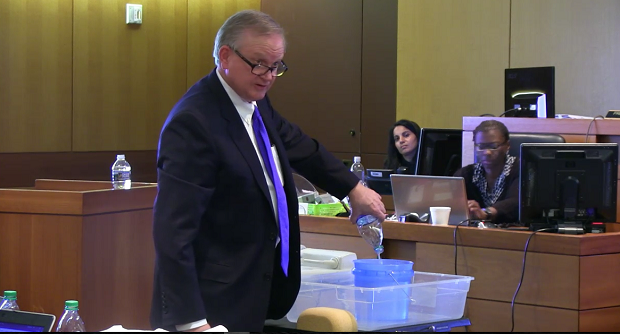
In his opening statement, William Stone empties water bottles into a bucket to demonstrate what he claimed was the massive fluid overload Shannon Trabue suffered before a pulmonary edema allegedly stopped her heart. A Fulton County State Court jury awarded $45.8 million in the case.
Atlanta—The foundation for last month’s $45.8 million verdict against an Atlanta-area obstetrics practice was built with an eye-grabbing opening and a lineup of experts that painted a vivid picture on the broader meaning behind a doctor’s standard of care, a lawyer who spearheaded the plaintiff's case said in detailing the trial to CVN. Trabue v. Atlanta Women's Specialists, 14-EV-001821.
“There are two standards of care. There’s the standard of care that puts patient’s safety first. And there’s the standard of care that allows the doctor to say ‘I’m sorry,’ second,” The Stone Law Group’s William Stone told CVN. “Now the question really boils down to: which do you think ought to be the standard of care in our community? Should it be the standard that is safety first, or should it be the ‘I’m sorry,’ standard? And everybody agrees that it should be the patient’s safety first.”
Jurors in February rendered the blockbuster award for the profound brain damage Shannon Trabue suffered in a heart attack days after the 2009 birth of her child. Trabue’s attorneys, including Stone; his sons, Ryals and James Stone; and Michael Regas II, claim Atlanta Women’s Specialists obstetricians, Drs. Rebecca Simonsen and Stanley Angus, failed to control Trabue's blood pressure spikes or properly treat her fluid overload after childbirth, which caused a pulmonary edema that stopped her heart.
In his opening statement, Stone used a bucket and a table full of water bottles to highlight his contention that Simonsen’s negligent care set in motion an ultimately catastrophic fluid overload. Walking jurors through Trabue’s treatment records, Stone poured water into a one-gallon bucket each time entries showed Trabue was given additional IV fluids, despite notes that she was not urinating enough. The water soon overflowed into a larger container Stone said represented Trabue’s body. And, importantly, her lungs.
“It’s visceral. You can watch [jurors] have this visceral reaction to all that water going in,” Stone said. “We wanted to use one-liter bottles so we could pour in the amount that she actually had on board, and watch them see how long it took to pour the bottles in, one at a time, one at a time, until you’ve just got so much up there you can’t do anything with it.”
If that demonstration grabbed jurors’ attention, Stone said his lineup of obstetrics experts, including Drs. Eric Lichter, George Saade, and Katharine Wenstrom drove home the claim that Angus and Simonsen failed to properly care for Trabue.
Wenstrom, the director of maternal-fetal medicine and professor at Brown University's The Warren Alpert Medical School and a co-author of Williams Obstetrics, underlined her feelings on Trabue’s treatment when she testified that, while she had appeared as a defense expert in other medical malpractice cases, this was the first time she had ever testified on behalf of a plaintiff. “When I read this case, I was just really horrified because this patient had one of the most common complications we see in pregnancy,” Wenstrom said. “I just thought this was such bad management, I had to speak out.”
Wenstrom told jurors she believed Trabue’s heart attack could have easily been prevented with proper blood pressure management and treatment through diuretics. “The thing that really makes this a tragedy to me is that this is the most common complication of general OB,” Wenstrom said. “I take care of women with all sorts of crazy medical problems that are very complicated. [But Trabue’s complication] is something that very OB is trained to [treat].”
Stone told CVN Wenstrom and the other obstetricians testifying for the plaintiff struck a compelling chord with the jury. “Wenstrom, she was just as strong as she could be,” Stone said. “But Lichter was, too, and Saade was just a great cleanup. They all hit home runs. The jury liked every one of them.”
As powerful as the lineup of obstetrics experts was, Stone said he believed the fact that a key witness testified out of order helped undercut the defense’s case in the eyes of the jury.
A cornerstone of the defense's case was the contention that unforeseeable complications from a pulmonary embolism, rather than a pulmonary edema, caused Trabue's collapse. Dr. J. Allen D. Cooper Jr., the defense's pulmonology and critical care expert from the University of Alabama-Birmingham, testified that CT film taken after Trabue's heart attack did not show the tell-tale fluid that would be present with a pulmonary edema. Instead, Cooper said he believed Trabue’s heart attack was more likely caused by an embolism, or blood clot in her lung.
The problem, Stone told CVN, was there was no evidence to support Cooper’s theory, and the plaintiff’s expert that followed Cooper, Dr. George Nichols, former Kentucky chief medical examiner, said Cooper’s argument was untenable. Stone said Nichols' testimony showed that “if it had happened like [Cooper's theory] we wouldn’t be talking about a brain injured woman, we’d be talking about a dead woman because she’d have never been revived [from] that code…. The clots would have been all through her lungs and she wouldn’t have been able to get any oxygen to any blood at [all].”
Stone said the contrast between the two experts undermined a key point of the doctors' defense. “[Cooper] got cut up pretty badly on his cross examination, and then Dr. Nichols came right behind him and said his theory is totally impossible.”
Jurors deliberated about 15 hours before delivering their verdict. Stone said he was not surprised by the award’s size, which included $18 million in damages for Keith Trabue's loss of marital relationship. “I was not the least bit surprised at that verdict because we had focus grouped this case 12 times before we tried it. It was well within the bell curve,” Stone said. “They were consistently awarding this couple the same amount for her pain and suffering and for his loss of marital relationship.”
Stone said he believed the facts of the case resonated with the jurors. "It gets back to the safe standard of care as opposed to the ‘I’m sorry,’ standard of care," Stone said. “What we’re talking about here in this case is not rocket science. What we’re talking about is just basic OB-GYN that any first-year resident in OB-GYN in any decent medical school in the country ought to know.”
Email Arlin Crisco at acrisco@cvn.com.
Related Information
Watch highlights of the trial through CVN's new Trial in 20 Minutes.
Not a subscriber?
Learn how you can see the best attorneys in action, in Georgia and across the country.





